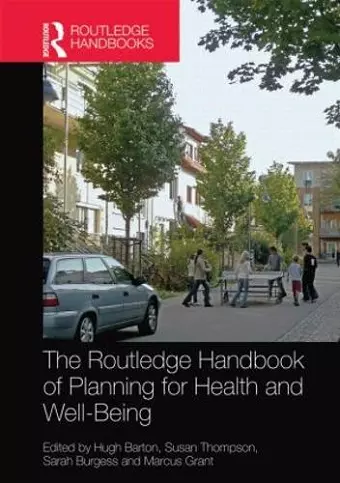The Routledge Handbook of Planning for Health and Well-Being
Shaping a sustainable and healthy future
Marcus Grant editor Susan Thompson editor Sarah Burgess editor Hugh Barton editor
Format:Hardback
Publisher:Taylor & Francis Ltd
Published:12th Jun '15
Currently unavailable, and unfortunately no date known when it will be back

Urban planning is deeply implicated in both the planetary crisis of climate change and the personal crises of unhealthy lifestyles. Worldwide health issues such as obesity, mental illness, growing health inequalities and climate vulnerability cannot be solved solely by medicines but also by tackling the social, economic and environmental determinants. In a time when unhealthy and unsustainable conditions are being built into the physical fabric of cities, a new awareness and strategy is urgently needed to putting health and well-being at the heart of planning.
The Routledge Handbook of Planning for Health and Well-being authoritatively and comprehensively integrates health into planning, strengthening the hands of those who argue and plan for healthy environments. With contributions from international leaders in the field, the Handbook of Planning for Health and Well-being provides context, philosophy, research, processes, and tools of experienced practitioners through case studies from four continents.
"This is a manifesto for how we should plan our neighbourhoods, towns and cities. It champions the objectives of health and well-being - time-honoured values in the history of planning - as the core means to achieving well-made, rich, beautiful and happy places. I'd like to see every politician, planner and developer given a copy. I'd like every household in the country to understand its message."
—Kevin McCloud, MBE
"This book will be a valuable resource for urban planners and design professionals as well as public helaht professionals and others interested in improving the health and wellbeing of the increasing majority of the world's people who are city dwellers."
—Trevor Hancock, Professor and Senior Scholar, School of Public Health and Social Policy, University of Victoria, Australia
"The Routledge Handbook of Planning for Health and Well-Being is an amazing resource to guide users in addressing health concerns at their source by providing discussions of various habitats, processes and tools for promoting healthy communities, and case studies from around the globe."
—Nisha D. Botchwey, PhD, MCRP, MPH, Georgia Institute of Technology, USA
"I welcome this book as a major step in taking forward the implementation of the healthy cities vision. Planning for health and well-being is a discipline-defining publication. It is the first in this field oriented around the needs of planning professionals and academics. It is extensive and authoritative, yet accessible in style and language. If you believe in an ethical and inspiring basis for urban planning, read it . Use it." - Agis Tsouros, Director, Policy and Governance for Health and Well-being, World Health Organization, Regional Office for Europe – in the Preface.
"This comprehensive volume on health and planningis without peer – international in scope and outstanding in scholarship. It re-joins planning to its original reformist twin, health, at a time of grave threat to human well-being in an urban age. A compelling and timely contribution."
—Professor Brendan Gleeson, Director, Melbourne Sustainable Society Institute, The University of Melbourne, Australia
"This book confirms the vital role that town planning has in making people’s lives healthier and happier. It provides clear evidence about the kinds of action we can take now to secure people’s well-being and reduce long term social care costs. This is simply a vital book for any practitioner interested in the future health and well-being of their community."
—Dr. Hugh Ellis, Head of Policy, Town and Country Planning Association, UK
"What does a healthy and sustainable city look like? It is a city of short ways, where all daily requirements are available within walking distance. It is a city which is socially cohesive, equitable, and values the natural environment. The principles are widely advocated, but most cities and countries are still going blindly in the opposite direction. This huge book from internationally-respected authors issues an urgent call to action. It providing a wealth of scientific evidence and practical exemplars to convince policy-makers they must change. It also has massive implications for the way we train built environment professionals: putting people first; putting health at the heart of planning."
—Wolf Daseking, former Chief Planner, Freiburg, Germany
"It is a remarkable fact that our Victorian forebears worked out that health and planning were inextricably linked. The great schemes of sanitation and urban improvement which had such tangible beneficial effects on the health of the population stand as a monument to their vision and practical problem solving. How did we lose our way? How did we arrive at a situation where planning and public health became so disjoined? In this excellent new book the authors point us in a direction which shows what can and could be achieved in the contemporary age. It is a landmark text which will be highly influential in the years to come."
—Mike Kelly, Institute of Public Health, University of Cambridge, UK, and former Director of the Centre for Public Health at NICE
"This book makes a welcome addition to the growing body of knowledge on planning for health and well-being, and I for one will be using it as a useful reference point going forward."
—Nicola Dempsey, University of Sheffield, International Journal of Housing Policy
ISBN: 9781138023307
Dimensions: unknown
Weight: 1370g
618 pages